Friday, September 28, 2012 9:37:09 AM
“Why Ampligen approval is more favorable the second time around.”
First of all, the perspective I have of HEB chances of approval are based upon the direction that the FDA is moving towards & not due to clinical data that HEB has provided. There data is far from being impressive & the company has had a poor history of not being honest with shareholders. I am not a HEB zealot but interested in making a case for a possible approval for Ampligen after being denied in past years. All that being said, the company has been active in their discussions with the FDA since June 2012. What I am convinced of, is that the FDA is working with HEB to help bring Ampligen to the market. The drug Ampligen has orphan drug designation & meets a high unmet clinical need. I believe they will do this one of two ways: #1) They will review the additional retrospective data that HEB resubmitted as part of their CRL and FDA will accept it or #2) The FDA will request that the company does a confirmatory Phase III study to address the efficacy & safety issue more closely & will approve Ampligen under Accelerated Approval. This use of Accelerated Approval would be so that patients who have no other treatment options for CFS have the opportunity to have access to the drug. This scenario allows the FDA to win in having HEB to a confirmatory Phase III trial & is also a win for the patients who can weigh the benefits & risks of taking this therapy. The stakeholder meeting on Sept 13th http://www.fda.gov/Drugs/NewsEvents/ucm319188.htm
addressed ways to make accelerated approval applicable to HEB or other companies in the future discovering ME/CFS therapies. Sandra Kweder, who is Deputy Director of the Office of New Drugs within the FDA, discusses this here on page 6:
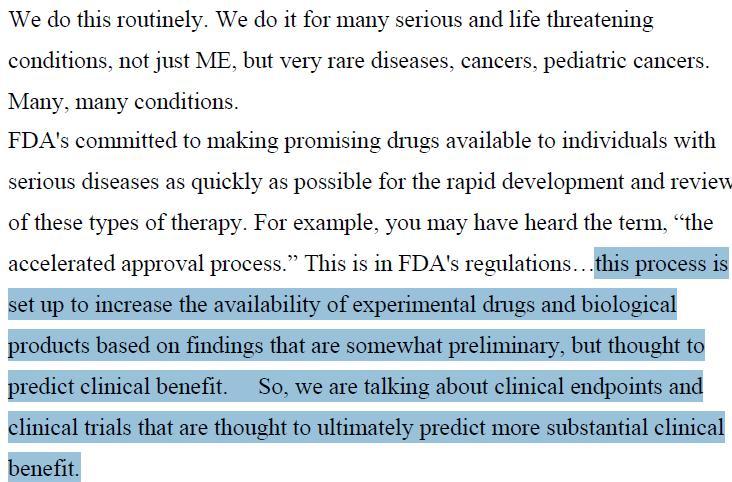

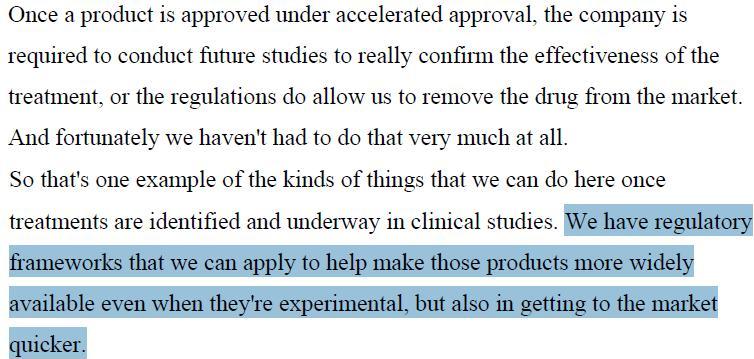
In a testimony on July 7th, 2011 Janet Woodcock, Director of the Center for Drug Evaluation & Research (CDER) showed support the renewal of PDUFA.
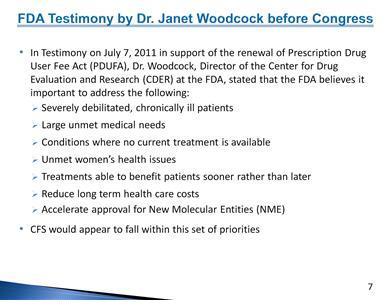
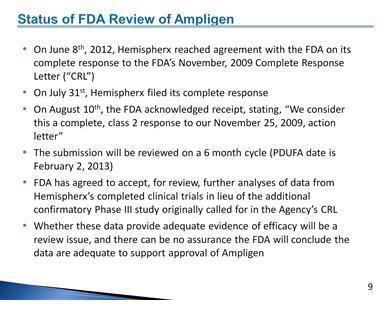
This is a new FDA reviewing information here as they recognize CFS as meeting a high unmet clinical need and they are evaluating and assessing new ways to make the HEB Phase III trial relevant. They are starting with focus groups from FDA (catalysts), AdCom Panel-Dec 2oth, and then the PDUFA-Feb 2nd without the company requiring another Phase III trial. Again..it is key for investors to focus on what is relevant with the FDA today and not rehash what was 2009 clinical trials or past financial statements. What is relevant now is that the company can work with FDA to get an accelerated approval where they will be required to do another Phase III but the drug will be approved on a restricted condition. Full approval will be granted on a positive Phase III trial.
-On June 8th, HEB reached agreement w/ the FDA on its CRL response to the FDA.
-On July 31st the company filed its CRL
-On Aug 10th, the FDA acknowledged receipt classifying it as a “complete, class 2 response to our November 25th, 2009, action letter.”
-The submission is being reviewed on a 6 month cycle w/ a PDUFA date of Feb 2nd, 2013.
-FDA agreed to accept, for review, further analyses of data from HEB’s completed clinical trials in lieu of the additional confirmatory Phase III study called for by the agency’s CRL in 2009.
Why is that? Because the FDA that is re-reviewing the application and that accepted this old data & additional data is being headed by Janet Woodcock. The previous FDA that reviewed the 2009 data was being reviewed by members of the FDA that comprised of six different divisions. In Jan 2011, CDER consolidated oversight of CFS treatments to the Division of Pulmonary, Allergy, & Rheumatology products. This allows the dedication the FDA is making by consolidating this group which gives them a more focused approach on reviewing CFS treatments.
Ms. Woodcock along with other members of the FDA now view CFS as a condition with a high unmet clinical need.
Key Members of the AdCom Board
-Dr. Theresa Michele is a Clinical Team Leader in the Division of Pulmonary, Allergy and Rheumatology Products, which is the division that would review products for chronic fatigue syndrome. In addition, she is the FDA representative Ex-Officio to the Chronic Fatigue Syndrome Advisory Committee at HHS.
-Dr. Keith Hull also in the Division of Pulmonology, Allergy and Rheumatology Products. He works with Dr. Michele and is an alternate on the Chronic Fatigue Syndrome board.
Sept 13th response letter to questions & emails regarding teleconf invite: http://bit.ly/THU8Lt
Also HEB is anticipating that their NDA for Ampligen, under review, will receive an early recipient of the new statutory provisions on expedited approval.
FDASIA was an option that the FDA suggested via the accelerated approval rout as an option. The FDASIA (FDA Safety & Innovation Act) was signed into law on July 9th. Once a product is approved under accelerated approval, the company is required to conduct future studies to really confirm the effectiveness of the treatment, or the regulations do allow us to remove the drug from the market. And fortunately we haven't had to do that very much at all.”
http://www.fda.gov/RegulatoryInformation/Legislation/FederalFoodDrugandCosmeticActFDCAct/SignificantAmendmentstotheFDCAct/FDASIA/default.htm
The Food and Drug Administration Safety and Innovation Act (the “FDASIA” statute), which was signed into law by President Obama on July 9, 2012, includes new provisions for the “enhancement of accelerated patient access to new medical treatments.” Specifically, the FDA is authorized by these new provisions to “approve an application for approval of a product for a serious or life-threatening disease or condition, including a fast track product, under section 505(c) or section 351(a) of the Public Health Service Act upon a determination that the product has an effect on a surrogate endpoint that is reasonably likely to predict clinical benefit, or on a clinical endpoint that can be measured earlier than irreversible morbidity or mortality, that is reasonably likely to predict an effect on irreversible morbidity or mortality or other clinical benefit, taking into account the severity, rarity, or prevalence of the condition and the availability or lack of alternative treatments.” (Public Law 112-144, Section 901)
The process is discussed on accelerated approval. This gives Ampligen a chance with this FDA that is dedicated specifically to improving the quality of life of patients with CFS. A key component of the Dec 20th Advisory Panel is that there will be a public testimony of patients with CFS. The panel will be able to hear the stories of patients who have no other treatment options.

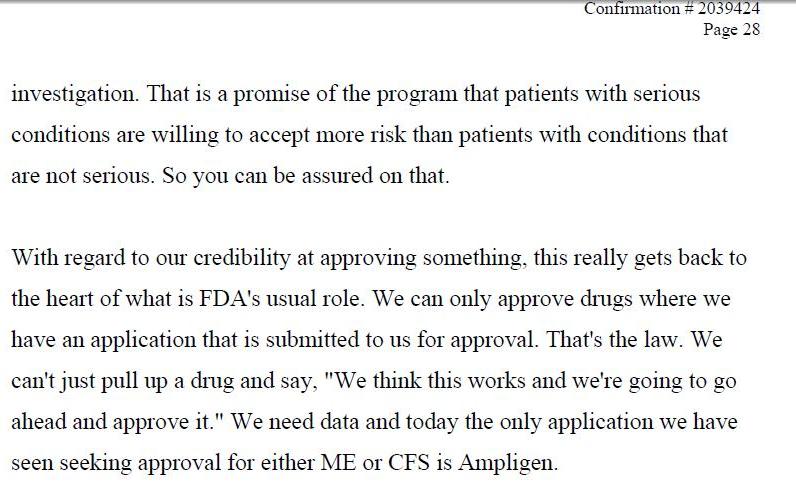

• The FDA considers ME/CFS to be a “serious and life-threatening” condition, making applications for marketing approvals to treat ME/CFS eligible for expedited review and other incentives.
• FDA uses the term ME/CFS to indicate inclusiveness of the conditions defined by ME and CFS criteria. As stated in background information for the call, “Drug development focuses on quantitative measures of benefit (e.g., symptom improvement), not on the name of the disease. Therefore, for the purpose of drug development, the reference of ME/CFS does not mean that FDA views the two diseases or syndromes as the same.”
• There are presently 8 open investigational new drug (IND) applications for indications for ME and/or CFS. Most are preliminary, for small numbers of individuals and the products being tested are mostly nutrutional supplements.
• FDA will provide an overview of the drug approval process at the next meeting of the federal CFS Advisory Committee on Oct. 3-4.
• FDA will host a webinar in mid-November on “excellence in advocacy” to advise groups and individuals about common themes that may help them be more effective in working across sectors to accelerate the drug discovery, development and approval process for ME/CFS.
• On Dec. 20, 2012, an FDA advisory committee will hold an open meeting to discuss the application for new drug approval for Ampligen submitted by Hemispherx Biopharma. Under current FDA regulations, a decision on the application will be made by Feb. 2, 2013.
• FDA will convene a scientific stakeholder meeting, open to the public, in spring 2013 to identify measurable outcomes that can be used in clinical trials to evaluate the effectiveness of therapies. FDA will involve academic researchers, clinicians with long-term clinical experience in ME/CFS, patients and advocates in this meeting.
• Forthcoming FDA guidelines on “enrichment strategies,” where a subgroup of patients within a diagnostic classification may demonstrate enhanced benefits of a treatment, may be useful to advance treatment of ME/CFS.
Source: http://www.research1st.com/2012/09/13/fda-opens-dialogue/
In closing, the road for Hemispherx will not be an easy one but I believe (from what I have seen) that the FDA is utilizing all options to help patients have access to this drug while still holding HEB to the fire in their commitment to making sure that an effective, safe, & viable option is available to patients with CFS. My goal here was to focus more on the intent & action of the FDA in addressing the needs & concerns of patients with ME/CFS. This will ultimately benefit patients and Hemispherx IMO. To that end, the FDA are showing their willingness to have flexibility to work with HEB to do what is in the best interest of patients. The dialogue continues & the Advisory Panel will be key in the progress of Ampligen with the meeting scheduled for Dec. 20th & a PDUFA date of Feb 2nd, 2013. As for the stock, it will continue to be volatile into these key catalyst dates but it makes for a very tradeable play as we are now within 90 days of the FDA ADCOM Mtng.
DISCLAIMER & INFORMATION FOR READERS: http://bit.ly/OlN9DB
First of all, the perspective I have of HEB chances of approval are based upon the direction that the FDA is moving towards & not due to clinical data that HEB has provided. There data is far from being impressive & the company has had a poor history of not being honest with shareholders. I am not a HEB zealot but interested in making a case for a possible approval for Ampligen after being denied in past years. All that being said, the company has been active in their discussions with the FDA since June 2012. What I am convinced of, is that the FDA is working with HEB to help bring Ampligen to the market. The drug Ampligen has orphan drug designation & meets a high unmet clinical need. I believe they will do this one of two ways: #1) They will review the additional retrospective data that HEB resubmitted as part of their CRL and FDA will accept it or #2) The FDA will request that the company does a confirmatory Phase III study to address the efficacy & safety issue more closely & will approve Ampligen under Accelerated Approval. This use of Accelerated Approval would be so that patients who have no other treatment options for CFS have the opportunity to have access to the drug. This scenario allows the FDA to win in having HEB to a confirmatory Phase III trial & is also a win for the patients who can weigh the benefits & risks of taking this therapy. The stakeholder meeting on Sept 13th http://www.fda.gov/Drugs/NewsEvents/ucm319188.htm
addressed ways to make accelerated approval applicable to HEB or other companies in the future discovering ME/CFS therapies. Sandra Kweder, who is Deputy Director of the Office of New Drugs within the FDA, discusses this here on page 6:
In a testimony on July 7th, 2011 Janet Woodcock, Director of the Center for Drug Evaluation & Research (CDER) showed support the renewal of PDUFA.
This is a new FDA reviewing information here as they recognize CFS as meeting a high unmet clinical need and they are evaluating and assessing new ways to make the HEB Phase III trial relevant. They are starting with focus groups from FDA (catalysts), AdCom Panel-Dec 2oth, and then the PDUFA-Feb 2nd without the company requiring another Phase III trial. Again..it is key for investors to focus on what is relevant with the FDA today and not rehash what was 2009 clinical trials or past financial statements. What is relevant now is that the company can work with FDA to get an accelerated approval where they will be required to do another Phase III but the drug will be approved on a restricted condition. Full approval will be granted on a positive Phase III trial.
-On June 8th, HEB reached agreement w/ the FDA on its CRL response to the FDA.
-On July 31st the company filed its CRL
-On Aug 10th, the FDA acknowledged receipt classifying it as a “complete, class 2 response to our November 25th, 2009, action letter.”
-The submission is being reviewed on a 6 month cycle w/ a PDUFA date of Feb 2nd, 2013.
-FDA agreed to accept, for review, further analyses of data from HEB’s completed clinical trials in lieu of the additional confirmatory Phase III study called for by the agency’s CRL in 2009.
Why is that? Because the FDA that is re-reviewing the application and that accepted this old data & additional data is being headed by Janet Woodcock. The previous FDA that reviewed the 2009 data was being reviewed by members of the FDA that comprised of six different divisions. In Jan 2011, CDER consolidated oversight of CFS treatments to the Division of Pulmonary, Allergy, & Rheumatology products. This allows the dedication the FDA is making by consolidating this group which gives them a more focused approach on reviewing CFS treatments.
Ms. Woodcock along with other members of the FDA now view CFS as a condition with a high unmet clinical need.
Key Members of the AdCom Board
-Dr. Theresa Michele is a Clinical Team Leader in the Division of Pulmonary, Allergy and Rheumatology Products, which is the division that would review products for chronic fatigue syndrome. In addition, she is the FDA representative Ex-Officio to the Chronic Fatigue Syndrome Advisory Committee at HHS.
-Dr. Keith Hull also in the Division of Pulmonology, Allergy and Rheumatology Products. He works with Dr. Michele and is an alternate on the Chronic Fatigue Syndrome board.
Sept 13th response letter to questions & emails regarding teleconf invite: http://bit.ly/THU8Lt
Also HEB is anticipating that their NDA for Ampligen, under review, will receive an early recipient of the new statutory provisions on expedited approval.
FDASIA was an option that the FDA suggested via the accelerated approval rout as an option. The FDASIA (FDA Safety & Innovation Act) was signed into law on July 9th. Once a product is approved under accelerated approval, the company is required to conduct future studies to really confirm the effectiveness of the treatment, or the regulations do allow us to remove the drug from the market. And fortunately we haven't had to do that very much at all.”
http://www.fda.gov/RegulatoryInformation/Legislation/FederalFoodDrugandCosmeticActFDCAct/SignificantAmendmentstotheFDCAct/FDASIA/default.htm
The Food and Drug Administration Safety and Innovation Act (the “FDASIA” statute), which was signed into law by President Obama on July 9, 2012, includes new provisions for the “enhancement of accelerated patient access to new medical treatments.” Specifically, the FDA is authorized by these new provisions to “approve an application for approval of a product for a serious or life-threatening disease or condition, including a fast track product, under section 505(c) or section 351(a) of the Public Health Service Act upon a determination that the product has an effect on a surrogate endpoint that is reasonably likely to predict clinical benefit, or on a clinical endpoint that can be measured earlier than irreversible morbidity or mortality, that is reasonably likely to predict an effect on irreversible morbidity or mortality or other clinical benefit, taking into account the severity, rarity, or prevalence of the condition and the availability or lack of alternative treatments.” (Public Law 112-144, Section 901)
The process is discussed on accelerated approval. This gives Ampligen a chance with this FDA that is dedicated specifically to improving the quality of life of patients with CFS. A key component of the Dec 20th Advisory Panel is that there will be a public testimony of patients with CFS. The panel will be able to hear the stories of patients who have no other treatment options.
• The FDA considers ME/CFS to be a “serious and life-threatening” condition, making applications for marketing approvals to treat ME/CFS eligible for expedited review and other incentives.
• FDA uses the term ME/CFS to indicate inclusiveness of the conditions defined by ME and CFS criteria. As stated in background information for the call, “Drug development focuses on quantitative measures of benefit (e.g., symptom improvement), not on the name of the disease. Therefore, for the purpose of drug development, the reference of ME/CFS does not mean that FDA views the two diseases or syndromes as the same.”
• There are presently 8 open investigational new drug (IND) applications for indications for ME and/or CFS. Most are preliminary, for small numbers of individuals and the products being tested are mostly nutrutional supplements.
• FDA will provide an overview of the drug approval process at the next meeting of the federal CFS Advisory Committee on Oct. 3-4.
• FDA will host a webinar in mid-November on “excellence in advocacy” to advise groups and individuals about common themes that may help them be more effective in working across sectors to accelerate the drug discovery, development and approval process for ME/CFS.
• On Dec. 20, 2012, an FDA advisory committee will hold an open meeting to discuss the application for new drug approval for Ampligen submitted by Hemispherx Biopharma. Under current FDA regulations, a decision on the application will be made by Feb. 2, 2013.
• FDA will convene a scientific stakeholder meeting, open to the public, in spring 2013 to identify measurable outcomes that can be used in clinical trials to evaluate the effectiveness of therapies. FDA will involve academic researchers, clinicians with long-term clinical experience in ME/CFS, patients and advocates in this meeting.
• Forthcoming FDA guidelines on “enrichment strategies,” where a subgroup of patients within a diagnostic classification may demonstrate enhanced benefits of a treatment, may be useful to advance treatment of ME/CFS.
Source: http://www.research1st.com/2012/09/13/fda-opens-dialogue/
In closing, the road for Hemispherx will not be an easy one but I believe (from what I have seen) that the FDA is utilizing all options to help patients have access to this drug while still holding HEB to the fire in their commitment to making sure that an effective, safe, & viable option is available to patients with CFS. My goal here was to focus more on the intent & action of the FDA in addressing the needs & concerns of patients with ME/CFS. This will ultimately benefit patients and Hemispherx IMO. To that end, the FDA are showing their willingness to have flexibility to work with HEB to do what is in the best interest of patients. The dialogue continues & the Advisory Panel will be key in the progress of Ampligen with the meeting scheduled for Dec. 20th & a PDUFA date of Feb 2nd, 2013. As for the stock, it will continue to be volatile into these key catalyst dates but it makes for a very tradeable play as we are now within 90 days of the FDA ADCOM Mtng.
DISCLAIMER & INFORMATION FOR READERS: http://bit.ly/OlN9DB
Join the InvestorsHub Community
Register for free to join our community of investors and share your ideas. You will also get access to streaming quotes, interactive charts, trades, portfolio, live options flow and more tools.







